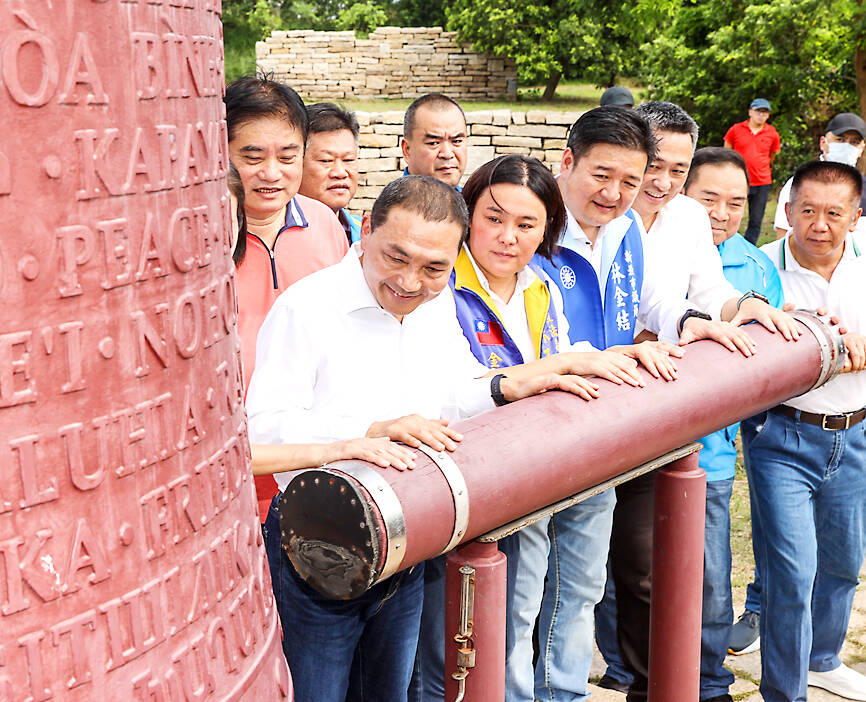New Taipei City Mayor Hou You-yi (侯友宜), the Chinese Nationalist Party’s (KMT) presidential candidate, yesterday proposed transforming Kinmen County into a cross-strait economic pilot zone and transportation hub to help facilitate peaceful exchanges between Taiwan and China.
During a trip to Kinmen, which is less than 10km from southeast China, Hou said that turning the area into an economic pilot zone that offers tax incentives would help attract Chinese investment in to the county.
He said that if elected in January next year he would enhance the major ports in Kinmen and increase the frequency of flights in and out of the county to make the zone possible.

Photo: CNA
He also proposed that Kinmen become a medical and healthcare hub, not only to solve the longstanding problem of a lack of medical resources in the county, but also to make it a destination for Chinese medical tourists.
The KMT candidate said that Kinmen should import electricity and natural gas from China’s Fujian Province to ensure supply, after it began importing water from Jinjiang, China, in 2018.
Regarding a proposal by some Kinmen residents to construct a bridge linking the county with Xiamen, China, Hou said that he is open to all opinions and respects the wishes of Kinmen residents who plan to hold a referendum on the issue.
He said that his support of a referendum and of importing electricity and natural gas from China are based on the condition that doing so would not negatively affect Taiwan’s national security.
The proposal for a Kinmen-Xiamen bridge has previously been criticized by the Democratic Progressive Party (DPP) as posing a national security risk should China invade.
Hou arrived in Kinmen yesterday afternoon, a day before the 65th anniversary of the 823 Artillery Bombardment of the county, a key battle that marked the beginning of the Second Taiwan Strait Crisis.
On Aug. 23, 1958, nine years after the Republic of China (ROC) government retreated from China to Taiwan after losing the Chinese Civil War, Chinese communist forces attacked Kinmen. Over the next 44 days, 475,000 artillery shells were fired at the islands in an attempt to take them over.
In his news conference, Hou thanked Kinmen residents for standing on the front line of defending the ROC from invasion 65 years ago.
The country’s prosperity and democracy would forever be indebted to them for their contributions, he said.
Hou reiterated his support for a version of the so-called “1992 consensus” that conforms with the Constitution, without elaborating.
He said that he would try to reopen dialogue with China on equal footing to prevent a cross-strait war, because “there can be no losers in peace and no victors in war.”
The “1992 consensus” — a term that former Mainland Affairs Council chairman Su Chi (蘇起) in 2006 admitted making up in 2000 — refers to a tacit understanding between the KMT and the Chinese Communist Party that both sides of the Taiwan Strait acknowledge that there is “one China,” with each side having its own interpretation of what “China” means.
Beijing shut down its official communication channel with Taiwan after the DPP, which has refused to accept the “1992 consensus,” came to power in May 2016.
The DPP says it does accept the “1992 consensus” on the grounds that Beijing has never acknowledged the ROC’s existence and that agreeing to the consensus implies acceptance of China’s claim over Taiwan.

Taiwan is stepping up plans to create self-sufficient supply chains for combat drones and increase foreign orders from the US to counter China’s numerical superiority, a defense official said on Saturday. Commenting on condition of anonymity, the official said the nation’s armed forces are in agreement with US Admiral Samuel Paparo’s assessment that Taiwan’s military must be prepared to turn the nation’s waters into a “hellscape” for the Chinese People’s Liberation Army (PLA). Paparo, the commander of the US Indo-Pacific Command, reiterated the concept during a Congressional hearing in Washington on Wednesday. He first coined the term in a security conference last

Prosecutors today declined to say who was questioned regarding alleged forgery on petitions to recall Democratic Progressive Party (DPP) legislators, after Chinese-language media earlier reported that members of the Chinese Nationalist Party (KMT) Youth League were brought in for questioning. The Ministry of Justice Investigation Bureau confirmed that two people had been questioned, but did not disclose any further information about the ongoing investigation. KMT Youth League members Lee Hsiao-liang (李孝亮) and Liu Szu-yin (劉思吟) — who are leading the effort to recall DPP caucus chief executive Rosalia Wu (吳思瑤) and Legislator Wu Pei-yi (吳沛憶) — both posted on Facebook saying: “I

Sung Chien-liang (宋建樑), who led efforts to recall Democratic Progressive Party (DPP) Legislator Lee Kun-cheng (李坤城), was released on bail of NT$80,000 today amid outcry over his decision to wear a Nazi armband to questioning the night before. Sung arrived at the New Taipei District Prosecutors’ Office for questioning in a recall petition forgery case last night wearing a red armband bearing a swastika, carrying a copy of Adolf Hitler’s Mein Kampf and giving a Nazi salute. Sung left the building at 1:15am without the armband and covering the book with his coat. Lee said today that this is a serious

A mountain blaze that broke out yesterday morning in Yangmingshan National Park was put out after five hours, following multi agency efforts involving dozens of fire trucks and helicopter water drops. The fire might have been sparked by an air quality sensor operated by the National Center for High-Performance Computing, one of the national-level laboratories under the National Applied Research Laboratories, Yangmingshan National Park Headquarters said. The Taipei City Fire Department said the fire, which broke out at about 11am yesterday near the mountainous Xiaoyoukeng (小油坑) Recreation Area was extinguished at 4:32pm. It had initially dispatched 72 personnel in four command vehicles, 16